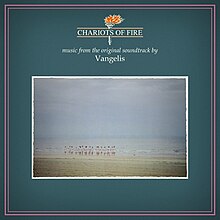Chariots of Fire (album)
| Chariots of Fire | ||||
|---|---|---|---|---|
 |
||||
| Film score by Vangelis | ||||
| Released | April 1981 | |||
| Recorded | 1980 | |||
| Genre | Film score | |||
| Length | 42:03 | |||
| Label | Polydor | |||
| Producer | Vangelis | |||
| Vangelis chronology | ||||
|
||||
| Professional ratings | |
|---|---|
| Review scores | |
| Source | Rating |
| Allmusic | |
Chariots of Fire is a 1981 musical score by Greek electronic composer Vangelis (credited as Vangelis Papathanassiou) for the British film Chariots of Fire, which won four Academy Awards including Best Picture and Original Music Score.
The album topped Billboard 200 for 4 weeks, reaching #1. It reached #2 in Canada, #5 in the UK, #5 in Australia, and #6 in New Zealand.
The opening theme of the film, called "Titles" on the album track listing but widely known as "Chariots of Fire", was released as a single; on the Billboard Hot 100 it reached #1 after five months and stayed there for a week.
The album reached number-one in the sales charts of various countries, including four weeks at number-one in the United States. In total, the album stayed 97 weeks in the Billboard 200, selling three million copies in the first year alone. The album reached number five in the UK Albums Chart and stayed in the listing for 107 weeks.
*sales figures based on certification alone
^shipments figures based on certification alone
The film's director, Hugh Hudson, chose Vangelis to compose the film's music, after becoming impressed with his albums Opera Sauvage and China and having worked with Vangelis on commercials in Paris during the 1970s. A CS-80 synthesizer was used on the recording. Vangelis played all the instruments, including synthesizers, acoustic piano, drums and percussion, and recorded the score in his Nemo studio in London, which he had set up in 1975. The music that he came up with, mostly electronic for a period film, initiated a new style in film scoring. The use of synthesizers in film scores beyond mere textures, and their convenience in allowing directors, producers, and studios to hear preliminary versions of full scores found its roots in Chariots of Fire.
...
Wikipedia
